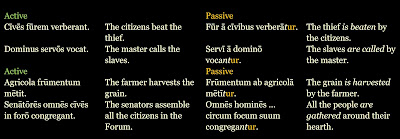Listen to the recording and fill in the blanks with the words listed below.
Puella et mātrōna
P: [1] __________ est Galba?
M: Galba, puella, [2] __________ est.
P: [3] __________ in Ītaliā?
M: [4] __________, Genāvae est.
P: Ubi [5] __________ Genāva? [6] __________in
prōvinciā Rōmānā est?
M: Minimē vērō, [7] __________ Helvētiā Genāva est.
P: Estne via [8] __________ [9] __________
Genāvam dūcit longa?
M: Via longa est et [10] __________ angustiās et
silvās dūcit.
P: [11] __________ lingua incolārum est?
M: Lingua incolārum in memoriā meā [12] __________.
ad; est; estne; in; minimē vērō; nōn est; nōnne; per; procul;
quae; quae; ubi
Note on pronunciation
In this little recording there is a feature that is worth
noting although, if you’re still at an early stage, you don’t need to “copy”
it: elision. Elision is where two vowels – one at the end of a word and one at
the beginning of the next word – “fuse”, either by the omission of one of the
vowels (which is a very obvious feature in CL poetry) or by slurring the
vowels. That isn’t unusual because French does it all the time: ce + est > c’est;
je ne + ai pas > je n’ai pas; the same feature is in Italian e.g. dov'è? And
you would sound “peculiar” in everyday English if you said “she is going to the
shops” because 99.99% of speakers would say “she’s”, “he’s”,
wouldn’t they?
Listen in particular to how he pronounces:
Ub[i e]st Galba?
Nōnn[e i]n provinciā Rōmānā est.
Via long[a e]st.
This elision also applies to words ending in -m and followed
by a vowel since, with strong evidence (including graffiti on the walls of
Pompeii) that it was pronounced as a nasal as in French bon and Portuguese
bom
Quae lingua incolāru[m e]st?

















